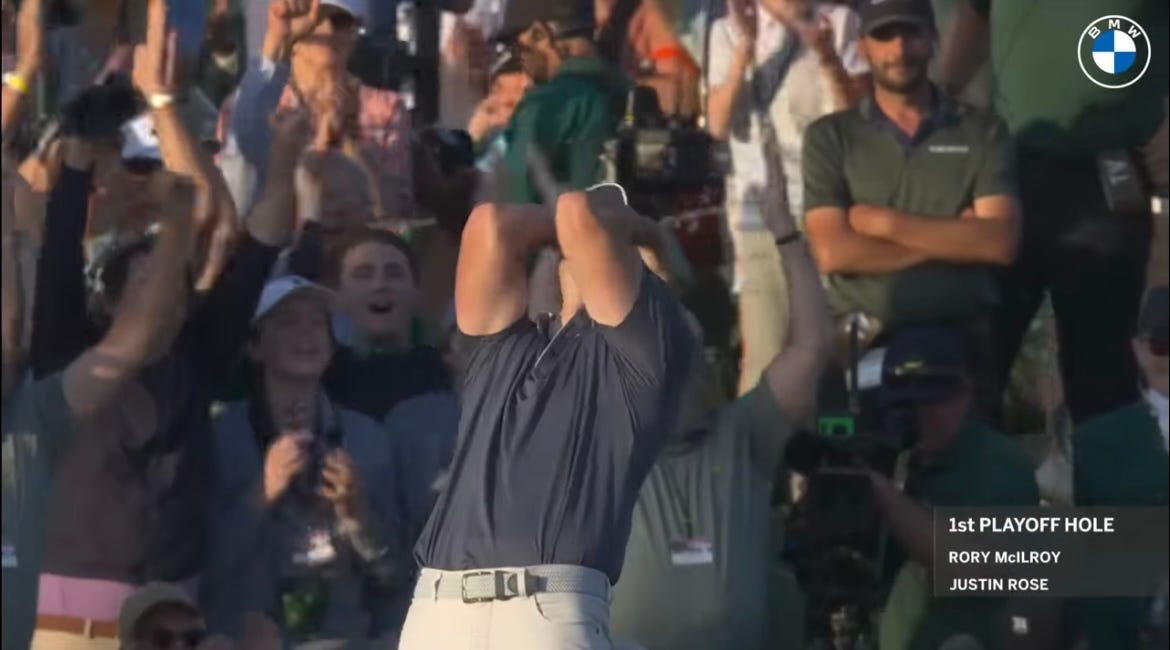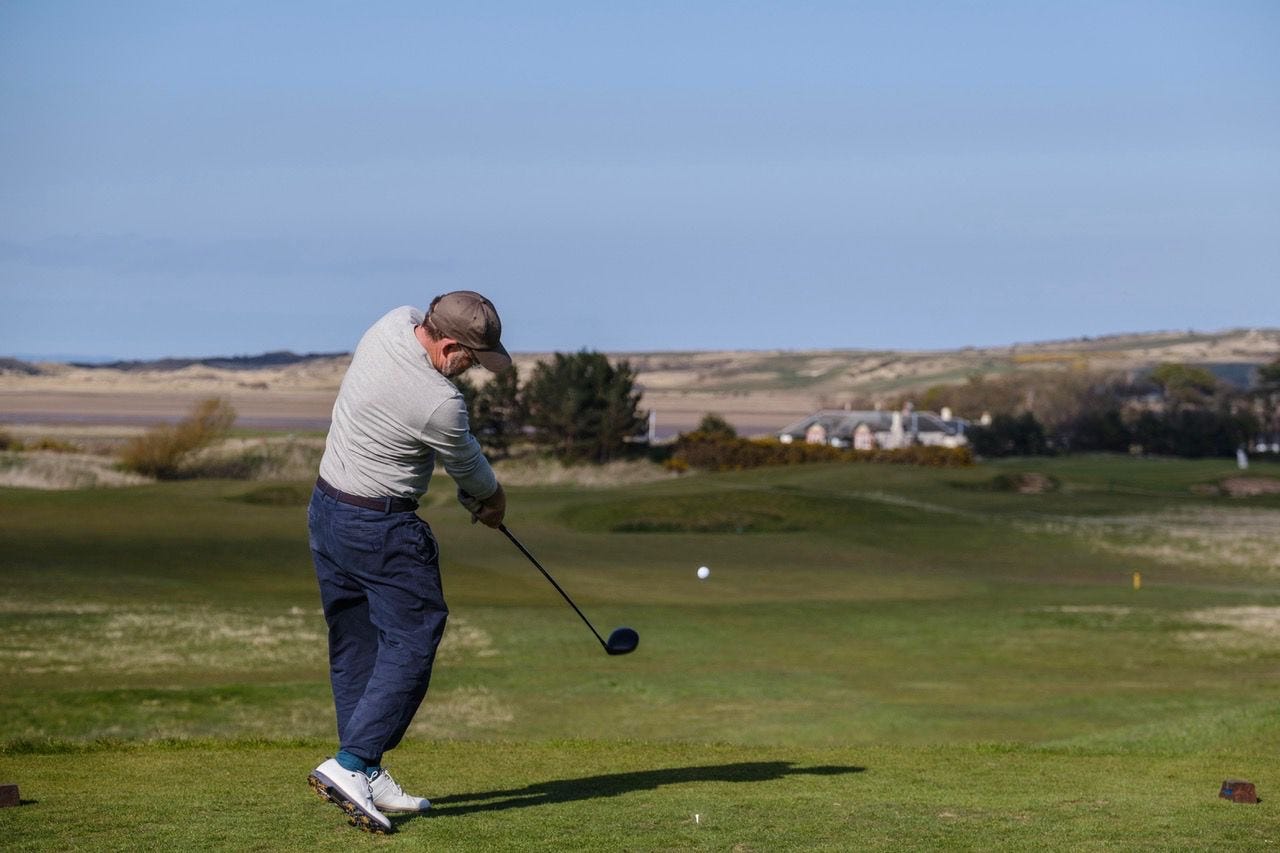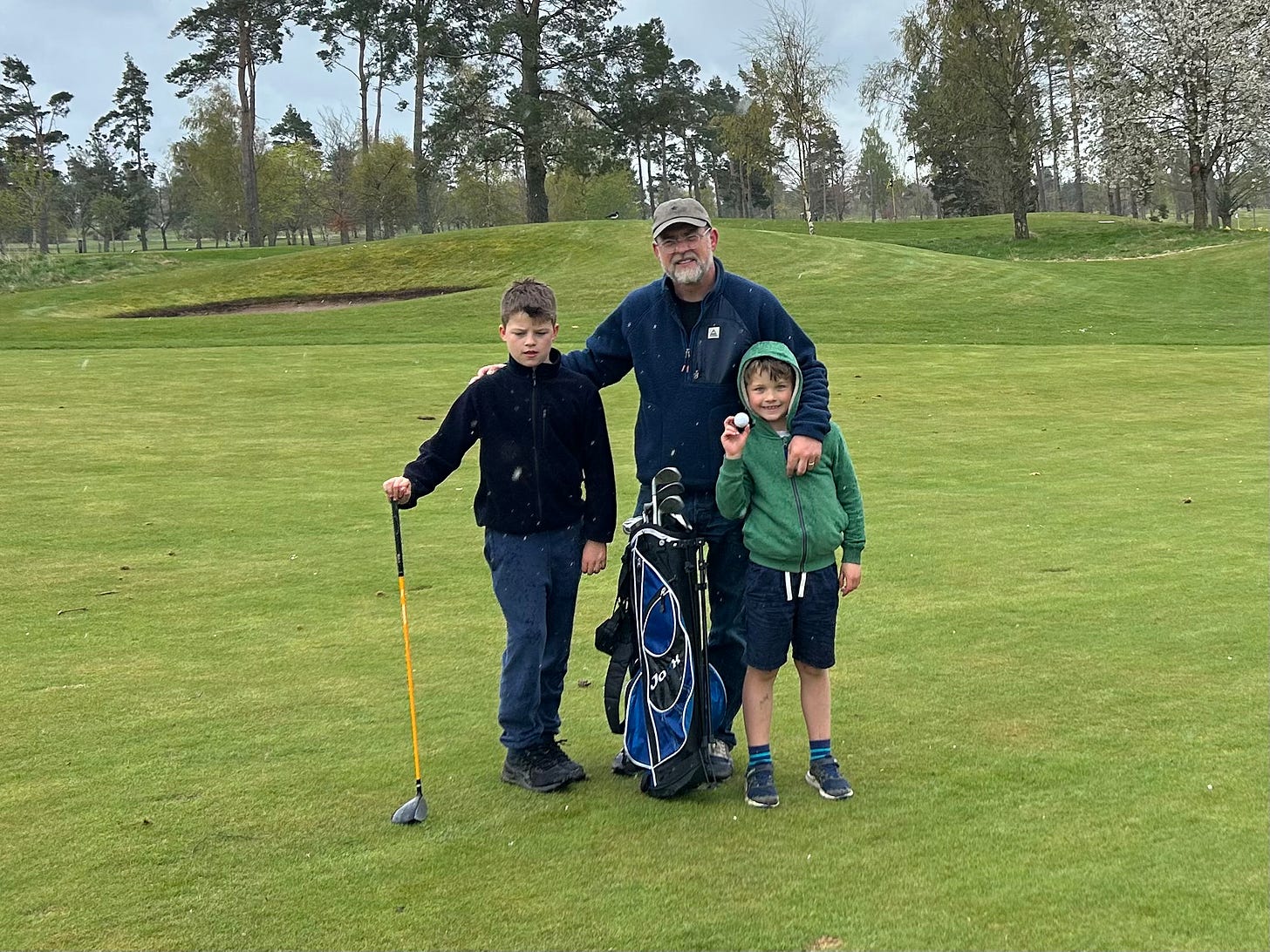15. Why Rory's Masters victory is a win for all of us
Reflections on the greatest Masters in my lifetime, a short but highly enjoyable spell in the zone, and why Scottish golf is just different
What an incredible Masters that was, the best of my lifetime. Better than Jack’s iconic win in 1986. Better than all the European victories. Better than Tiger’s first and fifth.
But perhaps the most momentous aspect of Rory McIlroy’s historic triumph was not the fact that it completed his career Grand Slam, supremely satisfying that this is for both him and everyone that cherishes the game’s history. What made it markedly different was that it made golf fans really care again.
Outside of the majors, the last few years have been pretty shameful for men’s professional golf. The delusional self-regard of many players, the inept and myopic leadership of the PGA Tour, the unseemly greed and grandstanding, Greg Norman, Phil Mickelson and their ilk, have succeeded in alienating many diehard fans.
The 2025 Masters was a reminder of how I used to feel watching European players battling for and winning Green Jackets in the 1980s and ‘90s
The Masters provided an emphatic and much-needed corrective and I believe much of this was down to the fact the tournament came down to two players who share a deep and authentic passion for the game.
The 2025 Masters was a reminder of how I used to feel watching European players battling for and winning Green Jackets in the 1980s and ‘90s. Those players felt like our own, like they were representing us.
In his excellent Quadrilateral Substack, Geoff Shackelford heralded the remarkable performance of Bernhard Langer, adding that the German veteran’s “backstory is a reminder how the Masters was ahead of its time in trying to bring global golfers together and how that’s never been more important as the game has spread internationally.”
He’s right, of course. When he won his first Masters in 1985, Langer plied his trade on the European Tour, as did Seve, Lyle, Faldo, Woosnam and Olazabal when they won theirs. They were truly international players who competed in the US, Australia and the Far East but left no doubt as to where their loyalties lay: Europe.
Since Seve became the first European to slip into a Green Jacket in 1980, nine others have gone on to earn their annual invites to the Champion’s Dinner, combining for 14 European victories in 45 years. That’s almost one every five Masters Tournaments.
But times have changed and the real emotions those victories stirred, the pride they inspired, have not been felt as keenly with the more recent successes of Danny Willett, Sergio Garcia and Jon Rahm.
Willett felt like an anomaly, just as Zach Johnson and Trevor Immelman did. Garcia and Rahm, despite their heartfelt tributes to Seve and Ryder Cup heroics in the colours of Team Europe, lived and played in America.
The PGA Tour‘s outsized gravitational pull has been created by a hierarchy that seems to believe male professional tournament golf should only be played in the United States
Rahm is a product of Arizona State University, which explains the American twang. Ludvig Aberg, who will surely be the next European to win the Masters, was playing for Texas Tech in the US collegiate system a few months before making his Ryder Cup debut. You could make an argument that Patrick Reed is a bigger European Tour stalwart than either of them.
The dwindling significance of the European (now DP World) Tour is a direct consequence of the outsized gravitational pull of the PGA Tour, a force fed by a hierarchy that seems to believe male professional tournament golf should only be played in the United States. It’s a brand of isolationism that is becoming ever more popular across the Atlantic.
Rory McIlroy and Justin Rose exemplify that pull. Both started out in Europe but there was never any question about where they wanted to end up.
During the most heated phase of the bitter conflict in men’s professional golf, McIlroy put himself forward as the PGA Tour’s most outspoken champion. He got badly burned for his troubles.
More recently he has developed a more global perspective, arguing that the best players in the world should play a schedule that his Masters-winning forebears were all too familiar with when blazing a trail in the eighties and nineties.
Did Rory’s win mean more because he believes the best tournaments should be shared among golf-rich markets such as Japan, Australia, South Africa, Europe and, god forbid, the sport’s home, the British Isles? No.
It was about one man conquering his demons, facing the most demanding test of his life and ultimately delivering on his immense promise. It made for the best, most compelling televised sport that I’ve watched in years, possibly ever.
His win meant more because of how much it meant to him, and what he put himself — and all of us — through. While Rory’s golf at Augusta National was frequently divine, the torment he experienced was something that anyone who plays golf can relate to.
“My battle today was with myself. It wasn’t with anyone else,” he explained afterwards. “You know, at the end there, it was with Justin, but my battle today was with my mind and staying in the present. I’d like to say that I did a better job of it than I did. It was a struggle, but I got over the line.”
Last week I wrote of the satisfaction that comes with witnessing a good player becoming a great player. What we witnessed last week at Augusta National was a great player becoming an all-time great. It’s something that happens once in a generation at best; just think of all the truly great players who never made that final, giant leap: Palmer, Trevino, Watson, Seve, Faldo, to name but five.
As an all-time great, I hope he goes on to win the 10 majors that his sublime talent deserves, and that he irrefutably secures his position as the greatest player of his generation.
I hope his opinions gain weight, just as Tiger’s have, and that he continues to use his influence for the betterment of the game everywhere, not just in the United States.
The fact that so many patrons on the grounds of Augusta National were pulling for a Northern Irishman speaks to the fact he is regarded as one of their own. The reaction to his win shows that the feeling is the same for golf fans across the world. Rory is one of us.
Justin Rose: Class act
I’ve never been a huge Justin Rose fan. I don’t know why. I remember his name being mentioned as a prodigiously talented junior in the mid-90s and enjoyed his unlikely run at the 1998 Open Championship as a 17-year-old amateur. Then he turned pro and it all went very wrong, a period he showed real class and determination in coming through.
Rose has gone on to build a brilliant career, winning the US Open at Merion with a seriously clutch performance, getting to No.1 in the world, holing iconic putts in Ryder Cup matches, winning an Olympic gold and having a real crack at last year’s Open at Troon, having come through Final Qualifying aged 44. He put himself through the latter because of what the Open means to him.
Rose has always come across as a good guy, maybe a touch vanilla at times, but he’s undeniably a fine ambassador for the game. He’s put his name and money into the Rose Series for women’s golf, which is helping new stars to come through; he’s unfailingly courteous; and he’s a gritty competitor who continues to squeeze the most out of a classic swing and professional attitude.
His post-round press conference last Sunday, shortly after losing his second sudden death playoff at the Masters, contained so many quotes that encapsulate what a classy individual he is. My personal favourites are the answers he gave to the last two questions he faced:
Q. What did you say to Rory?
A. “Yeah, Rory is a friend for sure. Walked on the tee. We shake hands. That's the business end of things. When it's all said and done, I said to him, Listen, I was glad I was here on this green to witness you win the career Grand Slam. That's such a cool, momentous moment in the game of golf. Yeah, that was it. He was obviously pretty overcome with emotion and probably not going to be able to take in much at the time. But yeah, I mean — yeah, that's — it was a big day in golf.”
Q. All your peers describe you as professional, like a classic professional. How would you define what that means for the rest of us?
A. “Hopefully good. If you're professional at something, you want to be regarded as — it's a compliment. I feel like I go about things diligently, the right way, give it my best.
Always try to put — yeah, I don't know what it means. I mean, it's tough to sit here and sort of talk about, you know, good attributes. For me, it's just about fulfilling my childhood dreams, really, and giving everything I've got and no regrets. I think that's what it's all about for me is just trying to look under every stone, push myself as hard as I can to be the best I can be, and I think that's what being professional is.”
I’ll definitely be pulling for Justin Rose in the future and if there’s any justice, he’ll get his Green Jacket.
Where every golfer longs to be
In that press conference, Rose gave a precise but succinct description of the place every golfer longs to be: in the zone.
“I got off to a strong start,” he said of his final round 66, in which he made 10 birdies. “Then something happened, for sure, around the middle of the round. I just kind of went into the place that you dream about going to. I felt so good with my game. Felt so good with my mind… I was laser focused out there.”
I enjoyed a short spell in the zone last week. whilst playing with friends at the wonderful Craigielaw on the East Lothian coast on the most perfect, still spring evening. I then made a short return visit to the zone the very next morning in equally stunning weather on the magical links at Kilspindie.
I came off both courses beaming with happiness at the overall experience rather than how I’d played.
Craigielaw and Kilspindie should be on any itinerary for this part of Scotland. I’ll be writing about them in more depth for Sounder.
“Go out and enjoy it boys”
One of my dreams is to play golf with my kids. My daughter, who is 13, has not shown much interest but I have high hopes for my two boys, aged 11 and seven. They do have a head start in the form of a perfectly sized golf course at the back of their house.
Whilst in Scotland for Easter with my in-laws, I took the boys to Edzell Golf Club, home to a wonderful parkland course that I try to play every time I’m here. I played it with friends on the morning of my wedding.
In addition to the 18-hole Old Course and a warm, welcoming clubhouse, Edzell has a small driving range and a short 9-hole course.
The boys had previously hit balls at this range, as well as the one at home, and they’d occasionally whacked balls around RNGC, but that was the extent of their experience. When I asked whether they could have a go on the 9-hole course, the response spoke volumes for what makes golf in Scotland so different.
Geoff, the charming gentleman in the starter’s hut, not only made a fuss of the boys and kitted them out with a bag of junior clubs and balls, he refused to accept a green fee. “Go out and enjoy it boys, and we hope to see you back here soon.”
It’s this kind of attitude that helps to produce players like Rory McIlroy.









Wonderful, as always, Daniel.
I wanted to write something after witnessing the best Sunday in Major golf I can remember. I just haven’t got round to it yet. And now I read this! Really well written and I agree with all of it. Great stuff!